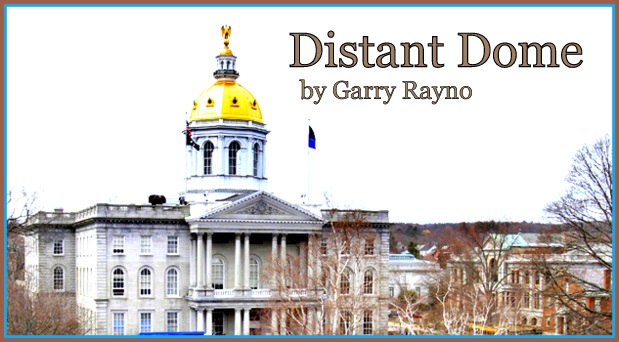Distant Dome is co-published by InDepthNH.org and Manchester Ink Link
By GARRY RAYNO, InDepthNH.org
CONCORD – Shenanigans abound at this point in the session as both sides seek to salvage their pet projects, party priorities or fixes to last-minute problems.
This is the follow-the-bouncing-ball time when you need to read every amendment proposed or even suggested and take them seriously. Nothing is really dead until lawmakers adjourn, go home and begin their reelection campaigns.

Garry Rayno
The jockeying began several weeks ago as bills killed by the House or Senate find new life as an amendment to another bill.
The continual fight this session between the House and Senate over an interest and dividends tax reduction is a good example. The House paid for the reduction by returning the research and development tax credit to its old cap instead of the $7 million approved last year, but the Senate wants the existing cap and upped the ante to eliminate the interest and dividends tax over a five-year period.
The House and Senate attached amendments to other bills to ensure each side’s position is on some legislation when conference committees to negotiate different versions begin work next week.
This is common practice but difficult for a casual observer to follow when most negotiations go behind closed doors and conference members arrive at public sessions to announce what has been decided.
This however, does not allow the public or reporters to see the trade-offs and deals that give birth to the final product, but is about the only way to reach compromise on controversial bills where everyone can have a small victory or “save face.”
Heavy-handed politicking
While the shenanigans are routine this time of year, what happened with the voucher bill or Freedom Scholarships or Senate Bill 193 last week is an example of heavy-handed politics practiced with a sledge hammer.
The bill is model legislation from national groups who want to move away from public education while enhancing opportunities in the private, religious and home school sectors.
The original bill would allow any parent to receive the state, per-pupil aid grant of about $3,600 to send their child to a private or religious school or to home school their students.
Under the bill, pre-school and kindergarten students would be eligible for the grants costing about $9 million that is not currently included in adequate education grant funding.
The bill would not require the private or religious schools, or home schooling parents to meet any standards or be accountable for their education programs.
As originally proposed, taxpayers’ money would be given to parents with no guarantee it is spent wisely or even for what it is intended.
The Senate approved the bill on a 14-10 party line vote last year, but it is easy to discern why the House Education Committee balked and retained the bill until this session.
The House Education and Finance committees made significant changes: narrowing those eligible to low-income students, capping the number of students per school who could leave, adding accountability and eliminating religious schools.
Even with those changes the bill failed to pass the House last week despite House leadership’s attempt to give it one more chance by adjourning Wednesday’s session after the bill had died a polite death (interim study) but before anyone could ask for reconsideration, which when voted down, means the bill cannot be brought up again.
The reconsideration vote is traditional practice after the final House vote on a controversial, heavily fought and lobbied bill.

House Speaker Gene Chandler, R-Bartlett
By adjourning the session when he did, House Speaker Gene Chandler gave his leadership team time to convince a few key wavering Republicans to change his or her vote and switch the outcome.
You might wonder why the House leadership would go to such extremes to save a bill that has been controversial since it was introduced. Proponents praised the opportunities it would allow students with difficulty learning in a traditional public school environment and opponents said it would downshift millions of dollars of education costs to local property taxpayers.
“School choice” is one of Gov. Chris Sununu’s legislative priorities. It is also a priority of President Trump and his Education Secretary Betsy DeVos and hence the GOP.
Koch brothers’ agenda
And it is also a Koch brothers’ priority, and those of like mind, not so much for the educational opportunities, but to diminish the power of teacher unions and unions in general.

Education Secretary Betsy DeVos
As the House killed off SB 193, Sununu worked to keep the bill alive, convincing Republicans in the Senate to attach it to a bill tabled the day before, House Bill 1636, so you know there was a backup plan.
House Bill 1636 was a simple bill to study teacher education and preparation programs and it passed the House on an unrecorded vote at the beginning of March.
The Senate Education Committee proposed an amendment that would give charter schools first dibs on any closed public school facilities.
The Senate approved the amendment on a 13-11 vote Wednesday and then tabled the bill.
It was taken off the table Thursday evening and the original SB 193 language was added and passed on a 14-10 party line vote.
The Senate may have done the opponents a favor by adding the original SB 193 which many Republican House members believe is far too expensive.
The battle over what to do with the Senate changes will be Thursday as House members will be asked to agree to the changes, asked to negotiate the differences or to kill the bill.
It will be interesting to see if the GOP leadership in the House and in the governor’s office can turn enough votes to at least put the bill into a conference committee with the Senate.
The stakes will be high as the GOP leadership will use its persuasive power to find the votes.

Former House Speaker Tip O’Neil
But all politics are local as the late former U.S. House Speaker Tip O’Neill used to say, and representatives in districts that would lose significant state money will be under the gun to block the bill.
This is bare-knuckle politics, it is not pretty and it usually creates a lot of long-lasting animosities.
As the old adage attributed to Otto von Bismarck goes: “If you like laws and sausages, you should never watch either one being made.”
Sausage-making classes have already begun at the New Hampshire State House.
Garry Rayno may be reached at garry.rayno@yahoo.com






